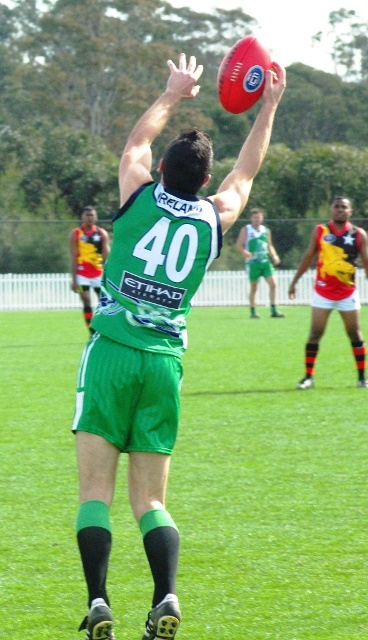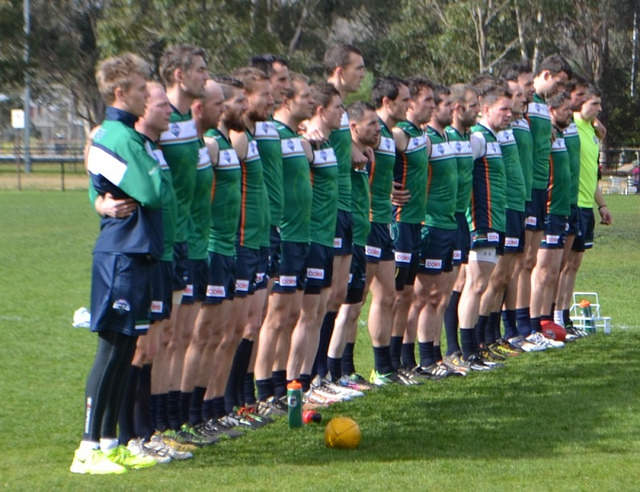The 2017 International Cup is about a week and a half away, and here is a preview of the Irish Banshees women's footy squad as they head to Melbourne for the tournament.

Australian Rules Football has a
brief history in Ireland.
However in the
years following, the level of interest, participation, and quality of play have
all taken leaps forward.
History
The
Australian Rules Football League of Ireland (ARFLI) was founded in 2000, but
Aussie Rules actually came to Ireland in 1999 when squads in Belfast and Dublin
recruited through the off season. The new Dublin Demons traveled to London in
April, 2000 to take part in preseason matches with the British Australian Rules
Football League (BARFL), and finished third out of 12 teams. The Demons then
won a best-of-three series with the Belfast Redbacks to be crowned the first
footy champion on the Emerald Isle.
“The
standard of the local league is quite competitive. It’s very welcoming and we
have players of all standards involved from the social player right up to those
aiming to play international footy,” Banshees coach Pat Leavy said. “In
addition we have had two new University teams start up in 2016/17 and this is
the area that we see a lot of new players coming from.”
Leavy
said he got his start in footy with the Midland Tigers in 2003, having been
introduced to the game by his brother Mark. Both men went on to represent
Ireland in the 2013 Euro Cup, and since then Leavy hasg teamed up with Shaun
Saurin and Brendan Kelly to develop the women’s game in Ireland. There are two
women’s teams in Ireland—the Dublin Angels and the Ulster Kookaburras.
The Banshees

Ireland’s
strengths lie in the interchangeable skillset learned in Gaelic Football,
skills that translate well onto the footy pitch. A potential disadvantage could
be stamina because they don’t play a lot of 18-a-side footy due to the size of
available fields. Most of their games are played nine, 12, or 14 to a side.
The Banshees won the inaugural
five-team International Cup in 2011 with an 18-point win over Papua New Guinea.
In 2014 there were seven sides and the Banshees fell in the Grand Final to
Canada Northern Lights. So not only has the interest level risen in Ireland,
it’s also gone up on the world stage as eight women’s teams will compete for
the 2017 International Cup.
Current run of play
Ireland
is rounding into form as they prepare for IC17. They are ranked fourth in the
most recent World Footy News rankings. The Banshees won the 2016 Euro Cup in
Lisbon, Portugal, and in May they traveled to the London Footy Carnival and
opened with a 50-point win over the London All-Stars. A 22-1 win over the
Canada Midnight Suns followed, and the Banshees fell by six points to the Great
Britain Swans. Ireland took home the trophy based on having the highest
percentage.
“The players
have been working very hard over the past 15 months in preparation for the
tournament with many players receiving sponsored assistance from local personnel;
trainers coupled with club and national team training sessions. The London Footy Carnival against three
quality teams also proved very beneficial for any new players on the team,”
Leavy said.
Rising star
Onora Mulcahy agreed.
“Even though Ireland won, it was a good wake up call to the
level of physicality to expect in August from the non-European teams.”
The Banshees
team is made up of players who have competed in the local league as well as the
London league and various country leagues in Australia. The Australian based players comprise of a
mix of girls who are taking a year out and have decided to “give it a go” while
in Australia, as well as and those who have settled in Australia after falling
in love with the lifestyle.
Who to watch for
Laura
Corrigan Duryea from Diamond Creek and the Melbourne Demons needs no
introduction to anyone who followed the inaugural AFLW season, while Carol
Breen and Gillian Behan are really impressing for UTS Shamrocks in the Sydney
Premier League. Leavy is excited about having Marie Keating from IC11 back in
the squad, while Carolann Cassidy has grown into a real leader for the team
since playing at IC14. Of those making their International Cup debut, expect big
things from Onóra Mulcahy and Clara Fitzpatrick. Duryea and Mulcahy are team
co-captains.
Fixture and
expectations
The Banshees
face the United States on Sunday, August 6, the European Crusaders on August 9,
and Papua New Guinea on August 13. Tough matches await against the United
States, an improving Papua New Guinea side, and against the European Crusaders.
But expect Ireland to get out of pool play and compete for a premiership. They
have competed in the first two IC Grand Final matches and they also add veteran
experience and firepower with international players joining the side.
Squad/Players:
1 Claire Donnelly, Ulster Kookaburras
2 Amanda Maginn, Ulster Kookaburras
3 Rachel McGee, Ulster Kookaburras
4 Sarah O’Donovan, U.C.C. Crusaders
5 Laura Flannery, Dublin Angels
6 Emma Kelly, Ulster Kookaburras
7 Fiona Roarty, Ulster Kookaburras
8 Carolann Cassidy, Ulster Kookaburras
9 Olivia McCann, Ulster Kookaburras
10 Onora Mulcahy,
Wandsworth Demons
11 Laura Corrigan
Duryea, Diamond Creek / Melbourne Demons
12 Carol Breen, UTS
Shamrocks
13 Niamh
Hainsworth, UTS Shamrocks
14 Linda Connolly,
Wandsworth Demons
15 Clara
Fitzpatrick, Diamond Creek
16 Megan Creegan,
Sydney University
17 Molly Cullen,
Dublin Angels
18 Marie Keating,
U.C.C. Crusaders
19 Aisling
Gillespie, Ulster Kookaburras—leading goalkicker at European Championships
20 Rachel Fox,
Perth Angels
21 Sandra Ryan, UTS
Shamrocks
22 Colleen Quinn,
Ulster Kookaburras
23 Gillian Behan,
UTS Shamrocks
24 Emma Treanor,
UTS Shamrocks
25 Maebh Moriarty,
Diamond Creek
26 Leona Russell,
Ulster Kookaburras
28 Aine Higgins,
Dublin Angels
29 Deborah
Geraghty, UTS Shamrocks
36 Christine
McCutcheon, UTS Shamrocks
30 Bronagh
Sheridan, Dublin Angels

 Hurricane Harvey dropped historic rainfall on the Texas coast in late August in the United States. Many locations reported at least 30 inches (76 cm) of rain. Nederland, east of Houston, recorded 64.58” of rainfall. Pearland, in Houston’s southern suburbs, a reported 9.92” fell in 90 minutes.
Hurricane Harvey dropped historic rainfall on the Texas coast in late August in the United States. Many locations reported at least 30 inches (76 cm) of rain. Nederland, east of Houston, recorded 64.58” of rainfall. Pearland, in Houston’s southern suburbs, a reported 9.92” fell in 90 minutes. So it was against this backdrop that the Houston Lonestars reported to San Diego recently for USAFL Nationals. The Division 1 side beat the Chicago Swans by five points, but fell to Portland Steelheads and the Quebec Saints to finish 1-2 in pool play.
So it was against this backdrop that the Houston Lonestars reported to San Diego recently for USAFL Nationals. The Division 1 side beat the Chicago Swans by five points, but fell to Portland Steelheads and the Quebec Saints to finish 1-2 in pool play. 

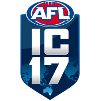
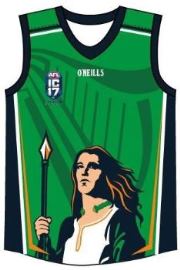
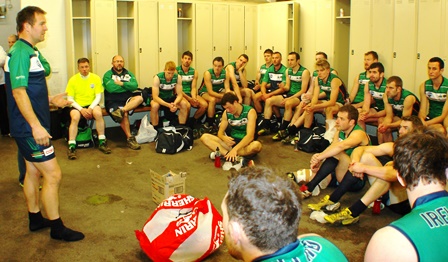 The Warriors have competed in every International Cup, winning the inaugural event over Papua New Guinea in 2002, placing 4th in 2005 and 2008, and becoming the first team to win multiple International Cup titles when they again defeated PNG in the 2011 final. They’re the fourth-ranked team in the world in the most recent World Footy News rankings.
The Warriors have competed in every International Cup, winning the inaugural event over Papua New Guinea in 2002, placing 4th in 2005 and 2008, and becoming the first team to win multiple International Cup titles when they again defeated PNG in the 2011 final. They’re the fourth-ranked team in the world in the most recent World Footy News rankings.